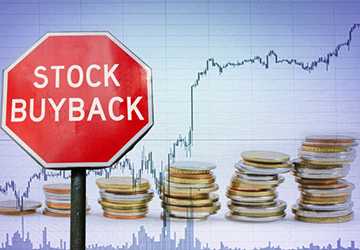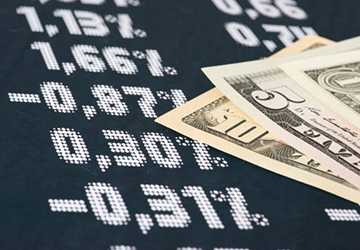When a company decides to re-invest in itself, a common strategy is a stock buyback, also known as a share buyback. This move can have various implications for investors and the company's financial landscape.

Understanding the Mechanics of Stock Buybacks
When a business decides to repurchase its outstanding shares from investors, it's engaging in what's known as a share buyback. This strategic manoeuvre diminishes the total shares available for public trading and can lead to several consequences:
● Appreciation in Share Worth: As the supply of shares contracts, the value of each individual share can potentially rise, as they now constitute a larger proportional stake in the company's equity.
● Enhancement of Financial Metrics: The act of repurchasing shares can bolster vital financial indicators, for instance, earnings per share (EPS) benefits from a reduction in the share count against which a company's profits are measured.
● Strategic Allocation of Surplus Funds: For companies sitting on substantial cash reserves, opting for a share buyback can represent a savvy use of those funds.
The Effects on Investors
The nuances of share buybacks are essential for those holding investments in stocks due to their potential impact. These are some ways investors might be affected:
● Opportunity for Enhanced Returns: A surge in stock prices after a buyback announcement can spell out increased value for existing shareholders.
● Indicator of Corporate Confidence: When a company proceeds with a buyback, it often suggests to investors that its brass might view its stock as undervalued—a vote of confidence in its trajectory.
● Shift in Share Distribution: Repurchasing shares can consolidate ownership, effectively boosting the equity stake of all remaining investors.
Corporate Angle on Share Repurchases
For a corporation, undertaking a share buyback can align with several strategic objectives:
● EPS Management: Reducing the amount of outstanding shares can inherently drive up EPS, a commonly used measure of a company's profitability.
● More Tax-Favorable Distributions: Companies may find buybacks more tax-efficient in rewarding shareholders than issuing dividends, subject to immediate taxation for the receivers.
● Discretionary Capital Return: Unlike the expected regularity of dividend payouts, buybacks afford a company the discretion to distribute cash to shareholders on an as-needed basis
The Effects of Stock Buyback on Market Perception
Stock buybacks can also sway public opinion about a company:
● Market Reaction: A buyback can lead to a positive market reaction, signalling to investors that the company believes its stock is undervalued.
● Influence on Stock Performance: Buybacks can sometimes prop up a company's stock performance, mainly if seen as a proactive approach to managing market value.
The Long-Term Perspective on Share Buybacks
While the immediate effects of a stock buyback can be positive, it's essential to consider the long-term implications:
● Financial Health: A company using debt to finance a buyback could be detrimental to its long-term financial health.
● Opportunity Cost: Money spent on buybacks is money not invested in business growth or other potential opportunities.
The Controversy Surrounding Stock Buybacks
Stock buybacks are not without their critics. Some argue that they can artificiallyinflate stock prices or benefit executives whose compensation is tied to stock performance. Others point out that buybacks can sometimes be a short-sighted use of capital that might be better spent on long-term growth initiatives.

Exploring the Strategic Timing of Stock Buybacks
Companies often time their stock buybacks to align with specific financial goals or market conditions:
● Market Downturns: Some companies see market downturns as an opportune time to conduct buybacks, purchasing shares at a lower price.
● Excess Cash Management: When companies accumulate cash beyond what isnecessary for operational costs and investments, a stock buyback can be an effective method of cash management, signalling to the market that they are proactive inenhancing shareholder value.
The Role of Investor Sentiment in Stock Buybacks
Investor sentiment plays a significant role in the success of a stock buyback. A positive investor response can amplify the benefits of a buyback, while scepticism can dampen the intended. Effects. Companies must carefully communicate their rationale and strategy behind a buyback to foster investor confidence.
Stock Buybacks and Executive Compensation
The link between stock buybacks and executive compensation is often scrutinized. There is a concern that executives might push for buybacks to increase the value of their stock options and boost their personal earnings, rather than focusing on the company's long-term growth.
Regulatory Environment and Stock Buybacks
The regulatory environment also affects stock buybacks. Changes in laws and regulations can influence both the ability of a company to repurchase shares and the attractiveness of doing so. Companies need to navigate these regulations carefully to avoid legal pitfalls.
Ethical Considerations in Stock Buybacks
There is an ethical dimension to stock buybacks as well. The decision to repurchase shares should be weighed against the company's responsibilities to its employees, customers, and society. The impact of buybacks on all stakeholders should be a consideration in the decision-making process.
The Future of Stock Buybacks
Looking ahead, the role of stock buybacks in corporate strategy may evolve. As debates continue regarding their economic and social impact, we may see shifts in how they areperceived and utilized. Investors and market watchers alike should stay informed on this topic.
Conclusion
Understanding stock buybacks is vital for anyone involved in the financial markets. It is not just about comprehending a financial transaction; it's about grasping its wider economic implications, strategic timing, and potential impact on a company's future. Whether you're an individual investor, company executive, or just someone interested in the mechanics of then market, the concept of a share buyback and its effects on personal investments and the broader economy cannot be understated. While they can be a sign of confidence and a boon for investors, they must be approached with a critical eye towards the long-term implications for the company and its shareholders.